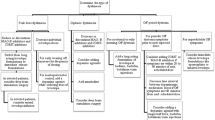Abstract
A patient experiencing L-dopa induced dyskinesia severe enough to prevent normal functioning was treated with behavior therapy utilizing meditation. The effects of treatment were assessed in a single case experimental design. Phase 1 consisted of baseline monitoring of severity and duration of episodes of left extremity jerking. During Phase 2, treatment was started with twice daily meditation for 30 minutes with an accompanying decrease in dose of daily L-dopa. Severity and duration of episodes were significantly reduced, and this was maintained through Phase 3 when the Phase 1 dose of L-dopa was reintroduced. The subject resumed normal functioning following treatment. A natural reversal occurred when he stopped meditating. During Phase 4, the recurrent high severity and duration of jerking were once again reduced when meditation was reinstated.
Similar content being viewed by others
References
Benson, H.The relaxation response. New York: Avon Books, 1975.
Bird, B. L., Cataldo, M. F., & Parker, L. Behavioral medicine for muscle disorders. In S. M. Turner, K. S. Calhoun, & H. E. Adams (Eds.),Handbook of clinical behavior therapy. New York: John Wiley & Sons, 1981.
Cleeland, C. S. Behavioral techniques in the modification of spasmodic torticollis.Neurology 1973,23 1241–1247.
Cooper, I. S., & Riklan, M. Organic and psychogenic factors in tremor.Psychiatric Annals 1973,3 50–53.
Davidson, R. M., & Schwartz, G. E. The psychobiology of relaxation and related states: A multi-process theory. In D. I. Mostofsky (Ed.),Behavior control and modification of physiological activity. Englewood Cliffs, New Jersey: Prentice-Hall, 1976.
Duvoisin, R. Parkinsonism.Ciba Clinical Symposia, 1976, 28, No. 1.
Fahn, S., & Calne, D. P. Considerations in the management of parkinsonism.Neurology 1978,23 5–7.
Finley, W. W., Niman, C., Standley, J., & Ender, P. Frontal EMG-biofeedback training of athetoid cerebral palsy patients: A report of six cases.Biofeedback and Self-Regulation 1976,1 169–182.
Gilroy, J., & Meyer, J. S.Medical Neurology (2nd ed.). New York: Macmillan Co., 1975.
Mostofsky, D. I. Recurrent paroxysmal disorders of the central nervous system. In S. M. Turner, K. S. Calhoun, & H. E. Adams (Eds.),Handbook of clinical behavior therapy. New York: John Wiley & Sons, 1981.
Nanjo, C., & Ornstein, R. E.On the psychology of meditation. New York: Viking Press, 1971.
Netsell, R., & Cleeland, C. S. Modification of lip hypertonia in dysarthria using EMG feedback.Journal of Speech and Hearing Disorders 1973,38 131–140.
Nusselt, L., & Legewie, H. Biofeedback und systematische desensibilisierung bei parkinsontremor: Eine fallstudie.Zeitschrift fur Klinische Psychologie 1975,4 112–123.
Shumaker, R. G. The response of manual motor functioning in parkinsonians to frontal EMG biofeedback and progressive relaxation.Biofeedback and Self-Regulation 1980,5 229–234.
Yahr, M. D. Abnormal involuntary movements induced by L-dopa: Clinical aspects. In A. Barbeau & F. H. McDowell (Eds.),L-dopa and parkinsonism. New York: Davis Co., 1970.
Zigmond, J. J., & Stricker, E. M. Behavioral and neurochemical effects of central catecholamine depletion: A possible model for subclinical brain damage. In I. Hanin & E. Usdin (Eds.),Animal models in psychiatry and neurology. Oxford: Pergamon Press, 1977.
Author information
Authors and Affiliations
Rights and permissions
About this article
Cite this article
Szekely, B.C., Turner, S.M. & Jacob, R.G. Behavioral control of L-dopa induced dyskinesia in parkinsonism. Biofeedback and Self-Regulation 7, 443–447 (1982). https://doi.org/10.1007/BF00998884
Issue Date:
DOI: https://doi.org/10.1007/BF00998884




